Tuesday Feb 24, 2026
Tuesday Feb 24, 2026
Thursday, 19 January 2023 00:00 - - {{hitsCtrl.values.hits}}
By Great Place to Work in Sri Lanka
The ‘logistics and transportation’ industry isn’t merely in the business of delivering goods and storage alone, it delivers trust, reliability, and connection as well. The importance of this industry was reiterated with the onset of the global pandemic as supply chains were faced with possible disruption. The competence of the global and local logistics and transportation industry played an integral part within the country and across international borders, as organisations facilitated trade and commerce to help businesses obtain material as well as transport their products across to customers.
Through a local perspective, Sri Lanka enjoys a geographical advantage as it lies in the centre of the major trade route which serves as a key logistics hub in the Indian Ocean. The Colombo port is one of the busiest container ports in the world. The logistics industry contributes to 2.5% of the gross domestic product of Sri Lanka, which represents around $ 2 billion to its economy. The Sri Lanka Exports Development Board (EDB) estimates that the total share of logistics in national exports is 7%. Further, the industry is said to provide full-time direct employment to over 40,000-50,000 people. 70% of registered service providers are local while the rest are multinational.
Considering the importance of the industry logistics and transportation service organisations including couriering, warehousing, ports and shipping that support delivery and supply chain were considered in this study.
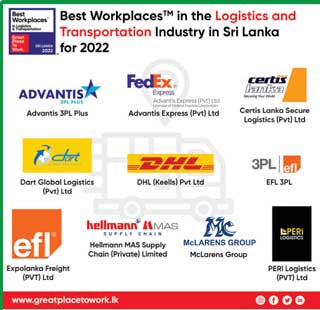
Maintaining workplace culture ‘beyond borders’: A Great Place to Work For All
Through an internal workplace perspective, it is an industry open to all; people from all walks of life can build a career for themselves through continuous on-the-job learning. However, a career in the logistics industry carries its own stress and challenges as teams work under an extremely competitive environment that is active 24/7. It is an industry in which significant turnover is a norm and practices support onboarding new hires quickly to have employees contributing to the business efficiently. The pressure in the industry can take its toll under the wrong workplace culture which can eventually lead to a decline in performance. Therefore, a healthy workplace culture plays a key role in long term sustainability of an organisation in this industry.
During this year’s study cycle, over 6,200 employees from the industry were surveyed with an average response rate of 90%. This study data helped to determine the 10 Best Workplaces in the logistics industry and understand the differentiating factors between the best vs. the rest. A summary of findings is provided in this article.
Methodology for selecting the Best Workplaces
Great Place to Work is the globally recognised authority on studying and recognising Best Workplaces. Over the past 30+ years it has studied Great Workplaces and expanded its reach to over 150 countries and territories. Organisations utilise services to benchmark, understand key strengths and areas to improve on and act to drive workplace culture that supports organisational performance. The Sri Lankan study is based on the global model and a rigorous methodology, which has been researched, tested and carried out in similar studies worldwide. This study was conducted for organisations assessed between December 2021 and December 2022.
The selection follows the global ‘Great Place to Work For All’ methodology. 85% of the evaluation is based on the experience of trust and employees reaching their full human potential as part of their organisations – no matter who they are or what they do. These experiences are analysed in relation to each company’s size, workforce demographics and industry norms. The remaining 15% of the evaluation is based on all employees’ daily experiences of innovation, their organisations’ values and the effectiveness of their leaders to ensure a consistent positive experience.
The measurement tool used to assess workplace culture is based on two lenses; Firstly, the Trust Index© employee perception survey is conducted to understand the employee workplace experience and constitutes 75% of the total organisation score. In Sri Lanka, only organisations certified (for a period of 1 year) as a great workplace with more than a 70% minimum positive employee perception are considered for Best Workplaces studies in that year. Organisations are measured on whether employees Trust the people they work for, have Pride in work they do and share Camaraderie among people they work with. Secondly, the practices and processes in place to drive the employee experience are evaluated through a central submission termed the Culture Audit which constitutes the remainder 25% of the total score. Results for each of the listed organisations are audited to maintain accuracy and validity of its inclusion in the Best Workplaces List.
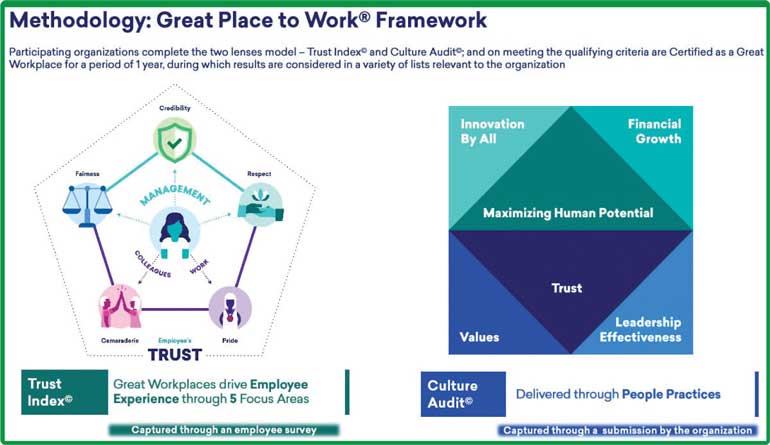
Results overview
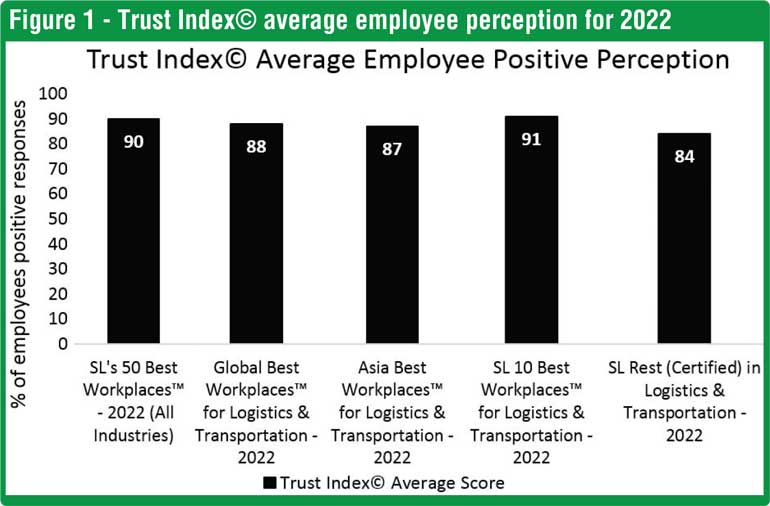
Figure 1 compares the Trust Index (TI) average employee positive perception which is a measure of the average positive perception of employees. The TI was measured across 58 core global statements and provides an ‘analytical view-point’ of an employee.
It is noteworthy that while logistics employees of participating organisations in Asia (87%) and globally (88%) are highly positive about their workplace culture, positive perception among Sri Lankan employees of the Best 10 are even higher (91%). A significant 7-point difference between the Best 10 vs. the Rest of the certified organisations in the sector, shows the average range in employee experience and space for improvement.
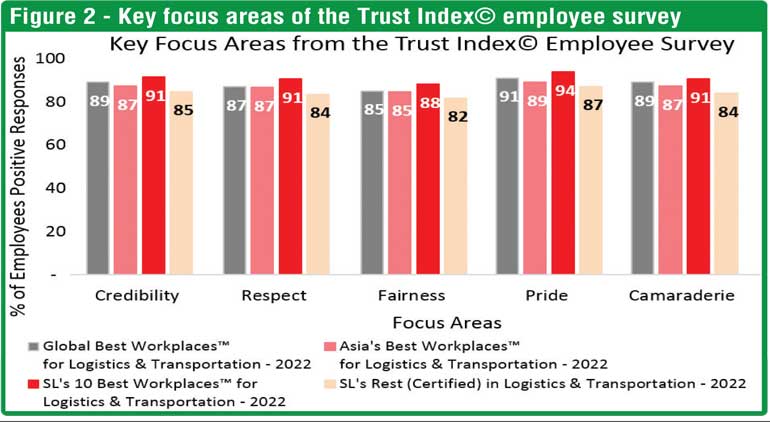
Key focus areas
Figure 2 illustrates the 5 key focus areas measured by the Trust Index employee perception survey (Refer methodology). It can be observed that fairness scores the lowest and pride scores highest across national and global data. This observation is common across most industries – this study shows that the logistics industry organisations follow the norm. The gap between the Best 10 vs. the Rest of the certified organisations is on average a consistent 7-point difference across the focus areas too.
Where the best 10 outperform the rest
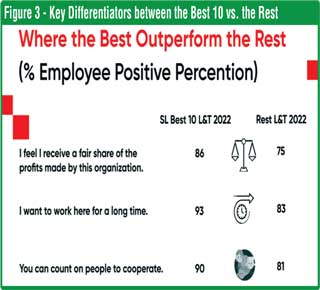
Figure 3 showcases the top 3 areas in which the gap between best 10 vs. the rest of the certified organisations in the industry is highest. The biggest gap in employee perception in best vs. rest is around fair share of profits made by the organisation which is an area under the fairness focus area and a sub focus area around equity. It is important in the context of helping employees feel a greater sense of ownership in the business doing well through their individual performance contributing to organisational performance and being rewarded in relation to it driving a win-win outcome.
Health indices for organisational culture
Figure 4 highlights the key indices of a healthy organisation culture and being a ‘Great Workplace For All’. The most significant health indicator between the Best 10 vs. the rest is a 10-point gap in the perception of employees wanting to be associated with the organisation for a long time. This is especially noteworthy for the Best 10 as a more short-term association is common in the logistics industry. The best 10 are ahead of the rest in all indices by a gap of 6 percentage points. Since the logistics industry is highly operational, having more employees motivated to come to work every day, putting in the extra effort, being agile in the face of change and everyone contributing to improving the organisation give the best workplaces an edge over the rest.
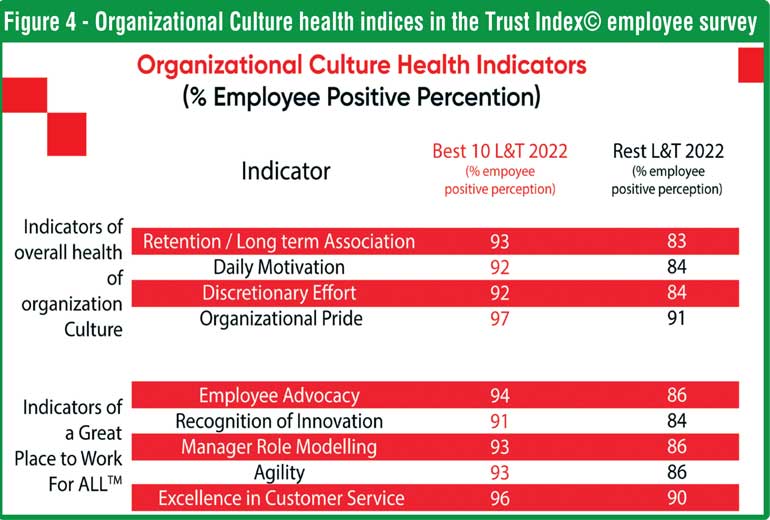
Key ‘drivers’ of the workplace
Key Drivers are the specific areas from the Trust Index© employee survey that are most closely linked to employees considering their workplaces as great. Perception in these areas drive the long term emotional connect that an employee has with the organization. Manager role modelling (93% positivity) and ethical behaviour (94%), Mental Health balancing (91%), Egalitarian treatment (94%) and Good facilities (93%) are the key drivers of perception for employees of Best 10.
Innovation for the long haul – The roots of innovation in workplace culture
Innovation in the workplace refers to the process of introducing new ideas, services, products, business processes, or methodologies in a work environment. Continuous development is a factor that needs to be practiced every day if businesses in the logistics industry are to stay competitive and on par with each other and employees need to be given the opportunity to contribute their suggestions. Fresh ways to do business gives a winning edge. The era of Artificial Intelligence (AI) and Internet of Things (IoT) have become extremely relevant for the logistics industry globally and started as an innovative idea in someone’s head. Implementation of innovations impacts the workforce to help increase productivity and stay competent and agile in a VUCA world. The Great Place to Work survey tool includes statements that measure the roots of an Innovative workplace culture as shown in Figure 7.
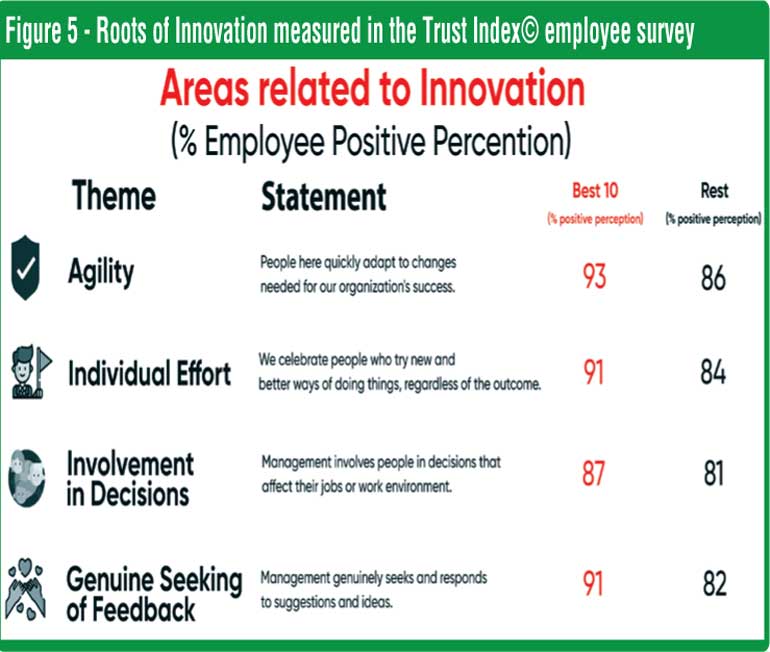 How can the industry expand its ‘boundaries’: Areas for improvement
How can the industry expand its ‘boundaries’: Areas for improvement
Analysis of the data from the study found Pride in the organisation and team (95% positivity), Management competence (94% positivity), Management Ethics (94%) and cooperation among people (95% positivity) to be the top strengths among the Best 10 Workplaces in logistics and transportation.
On the other hand, the data analysis also highlighted key areas that still have room for improvement even among the Best 10. Some of these are recurring themes both locally and globally. The key areas that require improvement are Fair pay (Positivity is 86% Best vs 75% Rest) and fair profit share (83% vs 74%), Work life balance
encouragement (88% vs 79%), fun at work (88% vs 81%), Employee involvement in decisions (87% vs 81%). While there is room for improvement it can be observed that the Best 10 still outperform the rest in these areas as well.
The uncertainty brought on by the
pandemic followed by the economic crisis in Sri Lanka is still eminent in the workplace. Buying power in Sri Lanka has decreased leaving the majority of employees in greater need of bridging the pay gap. The constant need for fire-fighting external stresses has led to longer work hours and reduced focus on recreational and bonding activities among employees. It is important to be conscious of these changes and act. Adopting a people first culture, digitalisation, innovation and sustainability are strategies that may improve the current shortcomings.
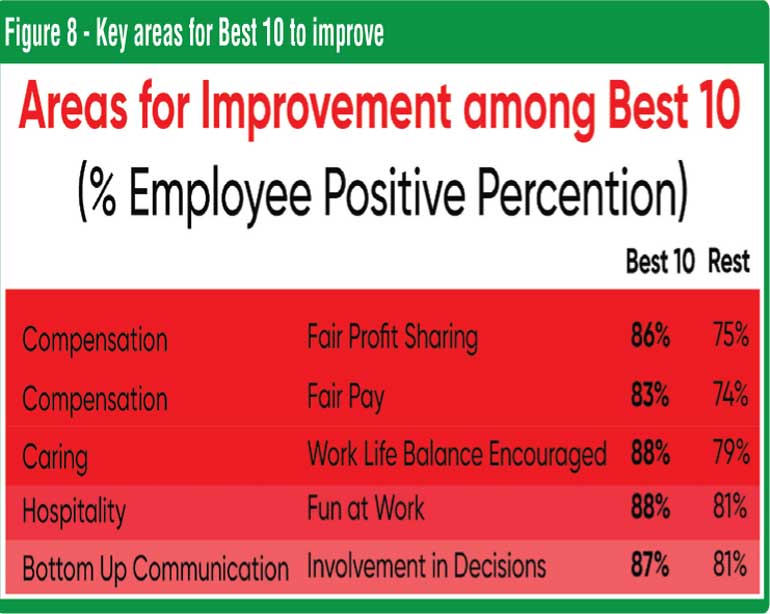 ‘Transporting’ best practices to the workplace future: Conclusion
‘Transporting’ best practices to the workplace future: Conclusion
The logistics industry was forced to pivot as the pandemic brought in a significant shift in local and global policies and consumer behaviour. Businesses across the globe were forced to develop new logistic strategies within a short planning time. Logistics and transportation was one of the industries that tirelessly worked throughout the pandemic and economic crisis and in doing so evolved. As the demand to both retain and recruit workers in the logistics industry continues to rise, it’s crucial for employers to stay on point with their employment strategies. The insights gathered by the Great Place to Work survey are a significant aid for employers to gather feedback and update practices that drive results. This will help great workplaces remain competitive in the growing market for logistics.
Great Place to Work’s mission is to help every workplace become a Great Place to Work For All so that organisations can maximise human potential through a High-Trust, High-Performance Culture that drives business, improves lives, and creates a better society. No matter where you are in your journey, you are invited to join in to discover and drive your employees’ positive perception and contribute to achieving the vision of making Sri Lanka a great place to work.
To better understand your organization’s employee perception in general and to be in the running for the Best Workplaces® Lists of 2023, contact Great Place to Work © at +94 11 454 5594 / 0766301200 or visit www.greatplacetowork.lk for more information.
(This article is written by Great Place to Work in Sri Lanka in collaboration with independent writer Sharika Mubarack.)